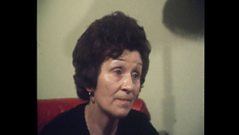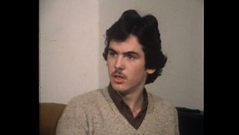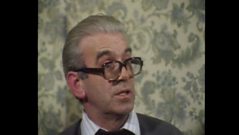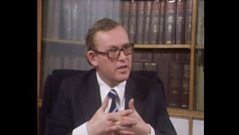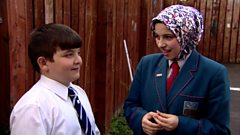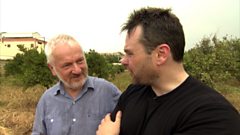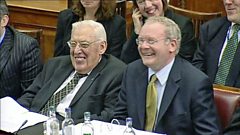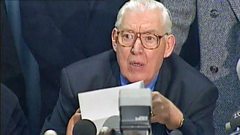
Death of Giuseppe Conlon
Giuseppe Conlon’s health continues to deteriorate in Wormwood Scrubs prison. He dies on Jan 23rd 1980, the same day Home Secretary William Whitelaw decides to grant him parole.
Giuseppe Conlon’s health continues to deteriorate in Wormwood Scrubs prison where he his serving a sentence for possession of explosives (please see context below). He dies on Jan 23rd 1980, the same day Home Secretary William Whitelaw decides to grant him parole.
Reporter Gavin Esler hears from Alastair Logan, Giuseppe Conlon’s solicitor.
Mr. Logan strongly believes Giuseppe to have been an innocent man who maintained his innocence to the end of his life.
In December 1979 Mr. Conlon’s health (he had a chronic chest condition) became so poor that he had to be moved from Wormwood Scrubs prison in London to the nearby Hammersmith Hospital. Just over a week later – despite having been on oxygen and a drip feed in hospital – he was returned to prison. The authorities informed his incredulous family they feared the Provisional Irish Republican Army (PIRA) would snatch him.
Mrs. Sarah Conlon (Giuseppe’s wife) responds, “Who would want him, only them that loved him?”She contends that Giuseppe would have died in ten minutes without medical treatment.
Harry Disley (the Guildford solicitor who represented Patrick O’Neill, Giuseppe’s co-accused) expresses his disappointment that the court system he had previously thought to be infallible could have convicted his innocent client.
Giuseppe Conlon was again moved from prison to hospital as his health worsened. He died on Jan 23rd 1980, the same day Home Secretary William Whitelaw decides to grant him parole.
The clip ends with Mrs. Conlon at her husband’s grave.
CONTEXT
On 5 October 1974 the Provisional Irish Republican Army (PIRA) targeted Guildford, Surrey, because it was situated close to a number of garrison towns. The PIRA planted two six-pound gelignite bombs in two pubs. The first exploded just before 9.00pm in the Horse and Groom, destroying the front of the building and shattering the windows of neighbouring shops.
It killed Paul Craig, a plasterer (22 years old); two members of the Scots Guards, William Forsyth (18) and John Hunter (17); and two members of the Women’s Royal Army Corps, Caroline Jean Slater (18) and Ann Ray Hamilton (19). A further sixty-five persons were wounded.
After the first explosion, other public houses were evacuated, including the Seven Stars where the second bomb exploded at approximately 9.35 p.m. without causing any serious injuries.
On November 7 1974 Gunner Richard Dunne, a soldier (42) and Alan Horsley, a sales clerk (20) were killed when a PIRA bomb exploded in the King’s Arms in Woolwich. Twenty-six people, including five soldiers, were injured.
In December 1974 the police arrested three men and a woman: Gerry Conlon, Paul Hill, Patrick Armstrong and Carole Richardson. In October 1975 these four were convicted of the Guildford and Woolwich bombings and given life sentences. The group was known as the Guildford Four.
On 4 March 1976 the Maguire Seven were convicted of making the explosives used in these bombings. The Maguire Seven were: - Anne Maguire, Patrick Maguire (Anne’s husband), Patrick Maguire (son of Anne and Patrick), Vincent Maguire (son of Anne and Patrick), Sean Smyth (brother of Anne), Patrick O’Neill (family friend) and Giuseppe Conlon (brother-in-law of Anne Maguire and father of Gerry Conlon).
Over the years, the cases of the Guildford Four and the Maguire Seven came under increasing legal scrutiny and the range of those seeking a review of the convictions extended widely. On 17 October 1989 it was announced that corruption proceedings would be taken against the police involved in the conviction of the Guildford Four. Two days later, with the exception of Paul Hill, those convicted for the bombings were released. This followed an announcement by the Director of Public Prosecutions that it would be wrong for the Crown ‘to seek to sustain’ the convictions of 1975 on the basis of confessions that they had later retracted. The Court of Appeal had decided that the DPP in 1975 had suppressed scientific evidence which conflicted with the confessions. Paul Hill remained in custody because he was implicated in a case that had not yet been resolved. His conviction was eventually quashed in April 1994.
On 26 June 1991 the Court of Appeal overturned the sentences on the Maguire Seven. All of them had completed their sentences. Afterwards many criticised the court for dismissing most of the grounds of appeal and had simply concluded that the hands of the convicted could have been innocently contaminated with nitro-glycerine.
Duration:
This clip is from
More clips from Giuseppe Conlon and the Bomb Factory
-
![]()
PIRA bomb England
Duration: 04:08
-
![]()
Patrick Maguire recalls his arrest
Duration: 01:43
-
![]()
Giuseppe Conlon is arrested
Duration: 02:06
-
![]()
Flaws in forensic evidence
Duration: 05:38
More clips from Spotlight
-
![]()
Hamza and Salam's escape—29/09/2015
Duration: 01:59
-
![]()
A Long Way from Clare to Here—29/09/2015
Duration: 02:25
-
![]()
Paisley and the Good Friday Agreement—Paisley and the Pretender
Duration: 02:13

